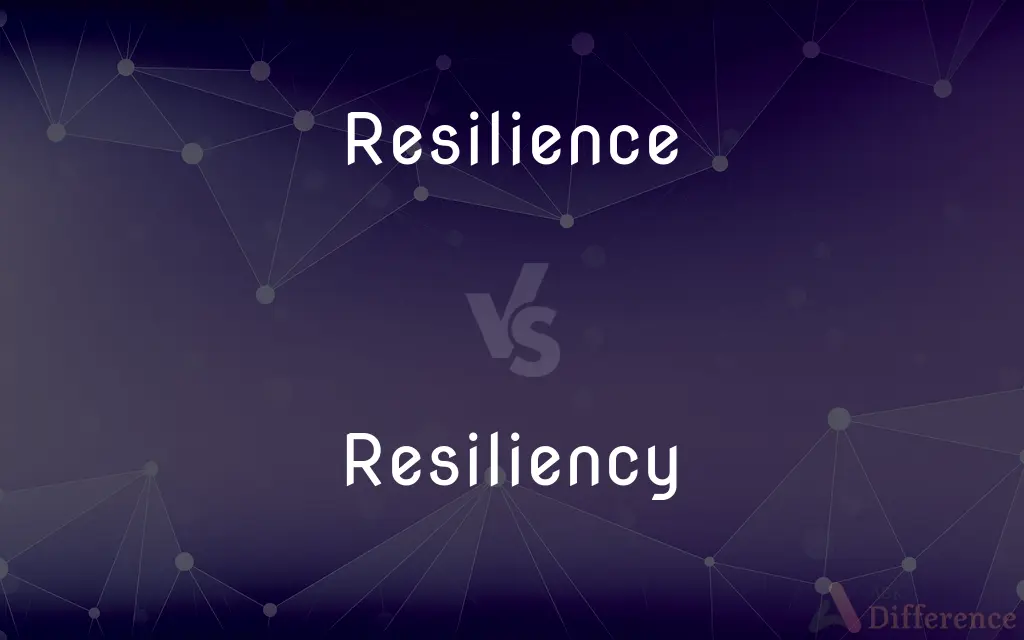Resilience vs. Resiliency — What's the Difference?
By Tayyaba Rehman — Updated on October 3, 2023
Resilience and Resiliency both refer to the ability to recover from difficulties, but "resilience" is more commonly used in general contexts, while "resiliency" is often employed in technical and specialized fields.

Difference Between Resilience and Resiliency
Table of Contents
ADVERTISEMENT
Key Differences
Resilience is widely utilized in various contexts to denote the capacity to bounce back from adversities and maintain functionality amidst challenges. The usage of resilience transcends from psychological contexts, implying emotional strength, to physical materials, illustrating robustness and durability. Conversely, Resiliency, while synonymous in several uses, sometimes finds its place more comfortably in specific technical, scientific, and military domains, indicating adaptability and recovery speed following disturbances.
In general discourse, Resilience is frequently the chosen term, possibly due to its crisp, succinct nature and universal understanding among diverse audiences. Its application ranges from describing ecosystems, societies, individuals, and materials, alluding to steadfastness and stability even during turbulences. Resiliency, however, with its additional syllable, can occasionally be viewed as an elongated form and may be selectively opted for in detailed, formal, or technical narratives where specificity and detailed expressions are paramount.
Culturally and traditionally, Resilience has imbibed itself into varied industries and public lexicon as a representative of strength, adaptability, and the tenacity to overcome hardships. It is heralded in stories of human triumph, societal progress, and technological advancements. Resiliency, despite being semantically similar, sometimes is relegated to particular industries or contexts, potentially due to its slightly more complex phonetic structure and specialized connotations in certain areas.
When employed in ecological or engineering terminologies, Resilience often refers to the inherent quality that allows systems, materials, or environments to withstand stressors and still maintain their primary function and structure. In similar veins, Resiliency may be referred to, albeit more meticulously, to underscore the rapidity and efficiency of recovery, thereby offering a slightly nuanced perspective in specific technical dialogues.
In psychological and social spheres, Resilience invariably conveys the psychological fortitude and adaptability of individuals or groups amidst struggles, symbolizing an unwavering spirit. Resiliency, while perfectly suitable, might be selected for detailed, academic, or formal discourses where the lexical richness and variant phonetics may be appreciated for diversifying the communicative texture.
ADVERTISEMENT
Comparison Chart
Common Usage
Widely used in various contexts.
Sometimes reserved for technical or specialized fields.
Phonetics
Shorter and potentially simpler phonetically.
Contains an additional syllable and can be seen as more complex.
Technical Application
Applied to denote stability amidst challenges.
May indicate rapidity and efficiency of recovery in certain contexts.
General Discourse
Predominantly preferred in everyday language.
Might be opted for varied phonetic expression in detailed narratives.
Industry Implication
Ubiquitously used across industries with general meaning.
Might be more prevalent in specific industries like engineering.
Compare with Definitions
Resilience
Resilience implies maintaining form amidst pressures.
The bridge’s resilience to strong winds was astounding.
Resiliency
Resiliency implies a speedy recovery to original form.
The material’s resiliency to stress was tested.
Resilience
Resilience may also indicate steadfastness in adverse conditions.
The team demonstrated great resilience in the final quarter.
Resiliency
Resiliency might focus on the rapidity of recovery.
Network resiliency is vital for maintaining online operations.
Resilience
Resilience refers to the capacity to withstand hardships.
The community showed remarkable resilience after the hurricane.
Resiliency
Resiliency signifies rebounding quickly from difficulties.
The forest displayed impressive resiliency after the fire.
Resilience
Resilience can denote psychological strength.
Her resilience amidst challenges was inspirational.
Resiliency
Resiliency can involve adaptability amidst disruptions.
His mental resiliency allowed quick adaptation to change.
Resilience
The capacity to recover quickly from difficulties; toughness
The often remarkable resilience of so many British institutions
Resiliency
Resiliency denotes the efficiency of regaining stability.
Economic resiliency ensures swift recovery from recessions.
Resilience
The ability of a substance or object to spring back into shape; elasticity
Nylon is excellent in wearability, abrasion resistance and resilience
Resiliency
Resilience.
Resilience
The ability to recover quickly from illness, change, or misfortune; buoyancy.
Resiliency
Synonym of resilience
Resilience
The property of a material that enables it to resume its original shape or position after being bent, stretched, or compressed; elasticity.
Resiliency
An occurrence of rebounding or springing back
Resilience
The mental ability to recover quickly from depression, illness or misfortune.
Resiliency
The physical property of a material that can return to its original shape or position after deformation that does not exceed its elastic limit
Resilience
(physics) The physical property of material that can resume its shape after being stretched or deformed; elasticity.
Resilience
The positive capacity of an organizational system or company to adapt and return to equilibrium after a crisis, failure or any kind of disruption, including: an outage, natural disasters, man-made disasters, terrorism, or similar (particularly IT systems, archives).
Resilience
The capacity to resist destruction or defeat, especially when under extreme pressure.
Resilience
The act of springing back, rebounding, or resiling; as, the resilience of a ball or of sound.
Resilience
The power or inherent property of returning to the form from which a substance is bent, stretched, compressed, or twisted; elasticity[1]; springiness; - of objects and substances.
Resilience
The power or ability to recover quickly from a setback, depression, illness, overwork or other adversity; buoyancy; elasticity[2]; - of people.
Resilience
The mechanical work required to strain an elastic body, as a deflected beam, stretched spring, etc., to the elastic limit; also, the work performed by the body in recovering from such strain.
Resilience
The physical property of a material that can return to its original shape or position after deformation that does not exceed its elastic limit
Resilience
An occurrence of rebounding or springing back
Resilience
Resilience relates to preserving function after disruption.
Economic resilience is crucial for overcoming financial crises.
Common Curiosities
Can "Resiliency" be used in describing materials and systems?
Yes, "Resiliency" can describe the ability of materials and systems to recover quickly and efficiently from disruptions or stressors.
Does "Resiliency" imply a slightly different meaning in technical contexts?
Sometimes, "Resiliency" might be chosen to emphasize the speed and efficiency of recovery in technical or scientific discussions.
Is "Resilience" suitable for describing psychological strength?
Absolutely, "Resilience" is commonly used to describe psychological fortitude and adaptability amidst struggles.
Are "Resilience" and "Resiliency" interchangeable?
Generally yes, but "Resilience" is widely used in various contexts, while "Resiliency" may be preferred in certain technical or formal discussions.
Is "Resilience" more common in everyday language?
Yes, "Resilience" is often preferred in general discourse due to its widespread recognition and simpler phonetic structure.
Share Your Discovery

Previous Comparison
Proclivity vs. Propensity
Next Comparison
Sonata vs. ConcertoAuthor Spotlight
Written by
Tayyaba RehmanTayyaba Rehman is a distinguished writer, currently serving as a primary contributor to askdifference.com. As a researcher in semantics and etymology, Tayyaba's passion for the complexity of languages and their distinctions has found a perfect home on the platform. Tayyaba delves into the intricacies of language, distinguishing between commonly confused words and phrases, thereby providing clarity for readers worldwide.














































